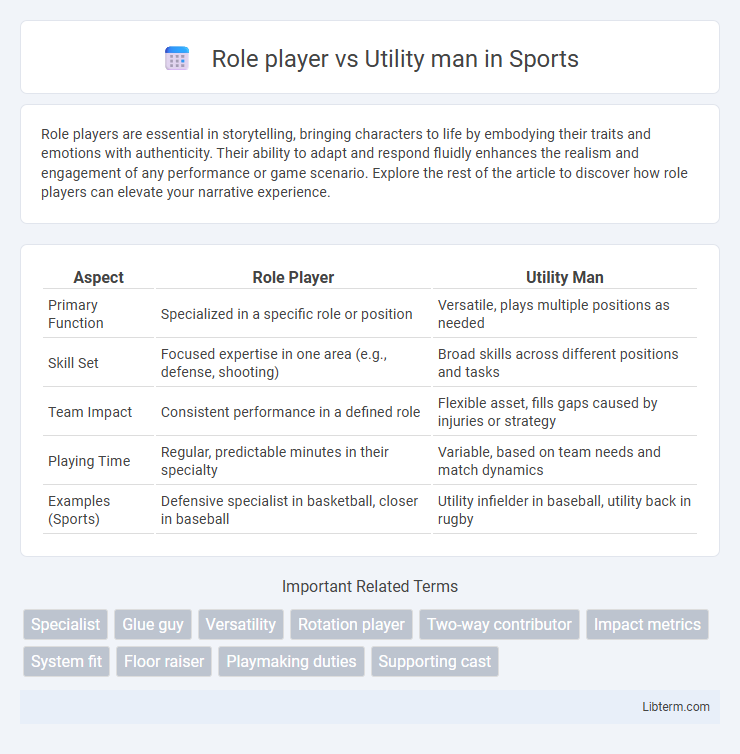Role players are essential in storytelling, bringing characters to life by embodying their traits and emotions with authenticity. Their ability to adapt and respond fluidly enhances the realism and engagement of any performance or game scenario. Explore the rest of the article to discover how role players can elevate your narrative experience.
Table of Comparison
| Aspect | Role Player | Utility Man |
|---|---|---|
| Primary Function | Specialized in a specific role or position | Versatile, plays multiple positions as needed |
| Skill Set | Focused expertise in one area (e.g., defense, shooting) | Broad skills across different positions and tasks |
| Team Impact | Consistent performance in a defined role | Flexible asset, fills gaps caused by injuries or strategy |
| Playing Time | Regular, predictable minutes in their specialty | Variable, based on team needs and match dynamics |
| Examples (Sports) | Defensive specialist in basketball, closer in baseball | Utility infielder in baseball, utility back in rugby |
Defining the Role Player: Key Characteristics
A role player is defined by their specialized skill set aimed at contributing effectively in specific game situations rather than consistently starting. Their key characteristics include adaptability, situational awareness, and the ability to perform under pressure, often excelling in niche roles such as defensive assignments or clutch moments. Unlike utility men who cover multiple positions, role players focus deeply on mastering a singular role to maximize team success.
What Makes a Utility Man Unique?
A utility man is unique for his versatility, capable of playing multiple positions across the field, which provides teams with flexible roster options and strategic adaptability during games. Unlike a role player who is often specialized in one position, a utility man excels at filling various defensive and offensive roles, allowing managers to address injuries, matchups, and situational needs effectively. This multi-positional skill set enhances team dynamics by maintaining consistent performance levels despite lineup changes or unforeseen circumstances.
Skillsets: Comparing Versatility vs Specialization
Role players excel in versatility, adapting to multiple positions and game situations with a broad skillset that includes defensive reliability, effective spacing, and situational scoring. Utility men offer specialized skills, often mastering a particular aspect such as three-point shooting, defense, or playmaking, contributing highly focused value to team strategies. The contrast lies in the role player's flexible adaptability versus the utility man's concentrated expertise, influencing team dynamics and coaching decisions.
Impact on Team Dynamics
Role players specialize in specific skills, providing consistent contributions that fit well within a team's established strategies and dynamics. Utility men offer versatility across multiple positions, enhancing team flexibility and allowing coaches to adapt lineups to various game situations. This adaptability often strengthens overall team resilience and fosters a culture of cooperation by filling gaps and supporting teammates where needed.
Value in Different Game Situations
Role players deliver specialized skills, excelling in specific game situations such as defense, hitting, or late-inning relief, providing maximum impact in high-leverage moments. Utility men offer versatile value by filling multiple positions, allowing managers to adjust lineups and cover injuries, thereby enhancing roster flexibility throughout long seasons. Both contribute significantly but differ in strategic deployment: role players maximize situational expertise, while utility men optimize overall team adaptability.
Career Longevity and Opportunities
Role players often experience longer career longevity due to their specialized skills that fulfill specific team needs, allowing them to remain valuable in consistent roles. Utility men enhance their career opportunities by demonstrating versatility across multiple positions, increasing their adaptability to various team strategies and injury replacements. Both roles contribute uniquely to a team's success, but utility men tend to secure more varied playing time, while role players maintain stability through expertise in niche functions.
Salary and Market Demand Analysis
Role players often command lower salaries compared to utility men due to their specialized skills and limited versatility in team sports, impacting their market demand. Utility men exhibit higher market value because their ability to cover multiple positions increases strategic flexibility, making them more indispensable for roster depth and injury contingencies. Salary trends reflect this dynamic, with utility players frequently securing mid-to-upper-tier contracts driven by teams' needs for adaptable talent capable of contributing across various game situations.
Famous Role Players in Sports History
Famous role players in sports history, such as Robert Horry in basketball and Shane Battier, excel by delivering clutch performances and specializing in key skills that support star teammates. Unlike utility men who adapt to multiple positions, role players maintain focused contributions that define their impact during critical moments. Their strategic importance is evident in championship runs where they often provide defense, timely scoring, and situational expertise.
Noteworthy Utility Men and Their Contributions
Noteworthy utility men in baseball have consistently proven their value by effectively covering multiple positions and enhancing team flexibility, often stepping up during critical moments to fill gaps caused by injuries or strategic shifts. Players like Ben Zobrist, who excelled both offensively and defensively across infield and outfield positions, significantly contributed to championship runs with their adaptability and clutch performances. Their ability to provide depth and maintain team performance under various circumstances underscores the strategic importance of utility men compared to traditional role players confined to specific positions.
Choosing the Right Fit: Team Needs and Strategies
Role players bring specialized skills that address specific team weaknesses, while utility men offer versatility across multiple positions, enhancing roster flexibility. Choosing the right fit depends on the team's strategic focus: a role player excels in executing defined tasks in high-pressure scenarios, whereas a utility man adapts to varying roles, providing depth and injury coverage. Evaluating current roster gaps and long-term goals ensures alignment between player skills and team needs, maximizing overall performance.
Role player Infographic

 libterm.com
libterm.com